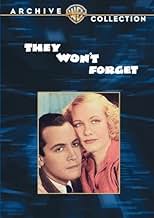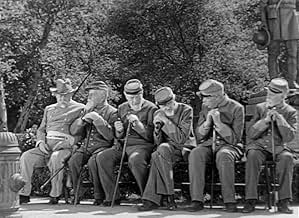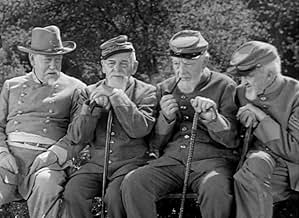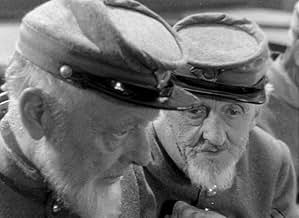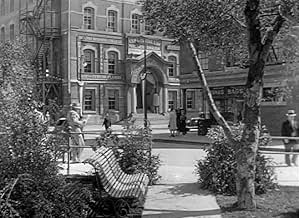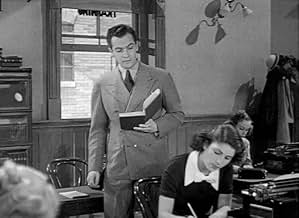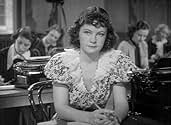IMDb RATING
7.2/10
2.1K
YOUR RATING
A politically ambitious district attorney, unscrupulous tabloid journalists, and regional prejudice combine to charge a teacher with the murder of his student.A politically ambitious district attorney, unscrupulous tabloid journalists, and regional prejudice combine to charge a teacher with the murder of his student.A politically ambitious district attorney, unscrupulous tabloid journalists, and regional prejudice combine to charge a teacher with the murder of his student.
- Director
- Writers
- Stars
- Awards
- 3 wins total
Elisabeth Risdon
- Mrs. Hale
- (as Elizabeth Risdon)
Sibyl Harris
- Mrs. Clay
- (as Sybil Harris)
- Director
- Writers
- All cast & crew
- Production, box office & more at IMDbPro
Featured reviews
Flawless blending of cynicism, humor and tragedy, this re-enactment of a real-life murder in the south consciously downplays the real-life anti-semitism in the real murder of Mary Phagan case, but carry more of an emotional wallop than the Jack Lemmon made-for-TV docudrama -- although the latter is still good on its own terms. Lana Turner has an impressive screen debut as the murder victim. Gloria Dickson is very powerful as the defendant's wife, and Claude Rains is magnificent as the politically minded prosecutor, but Allyn Joslyn as the cynical, burnt out reporter steals the show. A truly excellent example of how historically based movies can be among the most memorable.
In a small Southern town celebrating Confederate Memorial Day, a young woman (Lana Turner) is murdered. Suspicion quickly falls on her Northern teacher at business school, Robert Hale (Edward Norris), whom she had a crush on. Ambitious district attorney Andy Griffin (Claude Rains) uses this as an opportunity to build a name for himself, not caring about Hale's guilt or innocence. Hale is arrested and tried but the anti-Northern sentiment running through the town guarantees his trial won't be fair.
Great role for Claude Rains, who owns every scene he's in as a remorseless politician out to further his career regardless of cost. Edward Norris (Ann Sheridan's first husband) has probably his biggest role as Robert Hale and does a fine job. Film debut of Allyn Joslyn, who plays a slimy reporter colluding with Rains. Pretty Gloria Dickson plays Hale's wife. She has a potent speech at the end. First significant role for Lana Turner. Note the tight sweater which accentuates her...attributes. This is why she was dubbed "the sweater girl" early in her career. The rest of the cast is made up of familiar faces, including Otto Kruger and Elisha Cook, Jr.
Loosely based on the real story of Leo Frank, a Jewish man accused of murdering 13 year-old Mary Phagan in Georgia. He was lynched in 1915. The story here keeps antisemitism out of it, instead making it more of a focus on the resentments and prejudices of the South towards the North. Having grown up in the South, I know these sentiments were very real for many even decades after this movie was made. This is a film that examines everything from bigotry to mob mentality and the manipulation of the public by politicians and the media. Sociologically and historically relevant, it's a powerful movie from Warner Bros. with a good cast.
Great role for Claude Rains, who owns every scene he's in as a remorseless politician out to further his career regardless of cost. Edward Norris (Ann Sheridan's first husband) has probably his biggest role as Robert Hale and does a fine job. Film debut of Allyn Joslyn, who plays a slimy reporter colluding with Rains. Pretty Gloria Dickson plays Hale's wife. She has a potent speech at the end. First significant role for Lana Turner. Note the tight sweater which accentuates her...attributes. This is why she was dubbed "the sweater girl" early in her career. The rest of the cast is made up of familiar faces, including Otto Kruger and Elisha Cook, Jr.
Loosely based on the real story of Leo Frank, a Jewish man accused of murdering 13 year-old Mary Phagan in Georgia. He was lynched in 1915. The story here keeps antisemitism out of it, instead making it more of a focus on the resentments and prejudices of the South towards the North. Having grown up in the South, I know these sentiments were very real for many even decades after this movie was made. This is a film that examines everything from bigotry to mob mentality and the manipulation of the public by politicians and the media. Sociologically and historically relevant, it's a powerful movie from Warner Bros. with a good cast.
Mary Clay, played by Lana Turner (living up to her sweater girl fame) very early in her career is a student at a small southern town's business college. She has a crush on her teacher, Professor Robert Hale, played by Edwin Norris. Hale, is a man from the north - not really welcomed in a town that has a parade for Confederate Memorial Day. After the class was dismissed, Mary and a friend went for a soda and Mary forgot her vanity case. She went back to the school and was murdered.
Local newspaper staff bursts into Hale's apartment, tells Hale's wife that he's in jail, and after she faints, newsmen search the apartment, taking a honeymoon photo, searching through drawers.
This movie demonstrates how a quest for political power can taint a trial. Being an "outsider" can make it difficult for a fair trial. Although this takes place in the south, mob justice can and has occurred all over the country during the 1920's and 1930's.
Local newspaper staff bursts into Hale's apartment, tells Hale's wife that he's in jail, and after she faints, newsmen search the apartment, taking a honeymoon photo, searching through drawers.
This movie demonstrates how a quest for political power can taint a trial. Being an "outsider" can make it difficult for a fair trial. Although this takes place in the south, mob justice can and has occurred all over the country during the 1920's and 1930's.
One of Warner Brothers' `hard-hitting' social comment dramas of the 1930s, They Won't Forget leaves viewers all riled up though, today, maybe less at the judicial process in the Deep South than at Mervyn LeRoy's depiction of it in the movie. Based not too loosely on the Mary Phagan murder case of 1913, it updates the events to the late Depression and also advances the victim's age (Phagan was 13; here, the victim an unrecognizable Lana Turner, in her debut is a student at a small business college).
It's Confederate Memorial Day, April 26, and the college lets out early, unexpectedly for instructor Edward Norris, a Northerner. But Turner returns for the vanity case she's left behind. Hours later, her body is discovered at the base of an elevator shaft. The town prosecutor (Claude Rains, slinging a Southern drawl) smells a political advantage that might propel him to the state senate, an advantage of no use if the perpetrator is only the illiterate black janitor who found her. Suspicion falls on Norris, and soon the judicial establishment, the press and the townspeople have turned against him. Outside help a detective and a defense attorney prove of no avail. Turner is convicted and sentenced to death; when the governor commutes his sentence, he's lynched (as was Leo Frank in the original case). It's fast, brutal and pretty unsentimental.
LeRoy was known for his slam-bang, take-no-prisoners style but here he dawdles at first. Under the credits is a medley of songs of the South, bolstered by quotations from Lincoln and Robert E. Lee to soften up those touchy audiences in Dixie so they won't know what hit them. When he gets up to speed, however, he doesn't slacken, cutting quick to advance the action his movie's an unstoppable steamroller, just like the judicial railroading of the story (the lynching itself, expressed by a mailbag clipped off its hook by a passing train, is especially and darkly adroit).
But there's a near-fatal flaw in the story. We're meant to harbor persuasive doubts as to Norris' guilt, but the possibility of a suspect other than he is never more than fleetingly entertained. The movie purports to document a miscarriage of justice, but it fails to build an ironclad case.
It's Confederate Memorial Day, April 26, and the college lets out early, unexpectedly for instructor Edward Norris, a Northerner. But Turner returns for the vanity case she's left behind. Hours later, her body is discovered at the base of an elevator shaft. The town prosecutor (Claude Rains, slinging a Southern drawl) smells a political advantage that might propel him to the state senate, an advantage of no use if the perpetrator is only the illiterate black janitor who found her. Suspicion falls on Norris, and soon the judicial establishment, the press and the townspeople have turned against him. Outside help a detective and a defense attorney prove of no avail. Turner is convicted and sentenced to death; when the governor commutes his sentence, he's lynched (as was Leo Frank in the original case). It's fast, brutal and pretty unsentimental.
LeRoy was known for his slam-bang, take-no-prisoners style but here he dawdles at first. Under the credits is a medley of songs of the South, bolstered by quotations from Lincoln and Robert E. Lee to soften up those touchy audiences in Dixie so they won't know what hit them. When he gets up to speed, however, he doesn't slacken, cutting quick to advance the action his movie's an unstoppable steamroller, just like the judicial railroading of the story (the lynching itself, expressed by a mailbag clipped off its hook by a passing train, is especially and darkly adroit).
But there's a near-fatal flaw in the story. We're meant to harbor persuasive doubts as to Norris' guilt, but the possibility of a suspect other than he is never more than fleetingly entertained. The movie purports to document a miscarriage of justice, but it fails to build an ironclad case.
It begins with a disclaimer that all characters are entirely fictitious, etc. etc., and cites as source material a novel, but you can't fool us: It's the Leo Frank trial of 1915, updated to the then-present-day South and with Frank's Judaism carefully removed. Other than that, the details are surprisingly close to the actual trial, and the downbeat ending chillingly mirrors reality. Warner Brothers, known in the 1930s as the socially conscious studio, had a message to flog, and in this case it goes a bit overboard: No character has more than one dimension, and even that excellent actor Claude Rains, as the DA, snarls and rolls his eyes and gesticulates wildly, overdoing the blind ambition bit. But for its day it's a pretty brave and out-there indictment against mob violence, bigotry, and sensationalism, particularly the latter. Indeed, the message one takes from it today is that the media hasn't really grown worse in the intervening years -- there's just more of it.
Did you know
- TriviaThe novel "Death in the Deep South" and this movie version were based on the notorious murder trial and subsequent lynching of Leo Frank. The film mentions the suspect's Northern background, which was a factor in his lynching, but does not mention that he was Jewish. The real-life victim, Mary Phagan, was only 13 years old, a far cry from Lana Turner's 16-year-old "sweater girl."
- GoofsDuring the entire trial the shadow of the window is showing in the same place; behind the witness chair/over the back door of the courtroom.
- Quotes
Drugstore Clerk: What'll it all be be, ladies?
Imogene Mayfield: Dope and cherry, Fred.
Drugstore Clerk: [to Mary] How about you, half-pint?
Mary Clay: Make mine a chocolate malt and drop an egg in it as fresh as you are.
Drugstore Clerk: The hens don't lay 'em that good.
- ConnectionsFeatured in Hollywood and the Stars: The Angry Screen (1964)
- SoundtracksKingdom Coming
(1862) (uncredited)
aka "The Year of Jubilo"
Music by Henry Clay Work
Played during the opening credits
- How long is They Won't Forget?Powered by Alexa
Details
- Runtime
- 1h 35m(95 min)
- Color
- Sound mix
- Aspect ratio
- 1.37 : 1
Contribute to this page
Suggest an edit or add missing content


